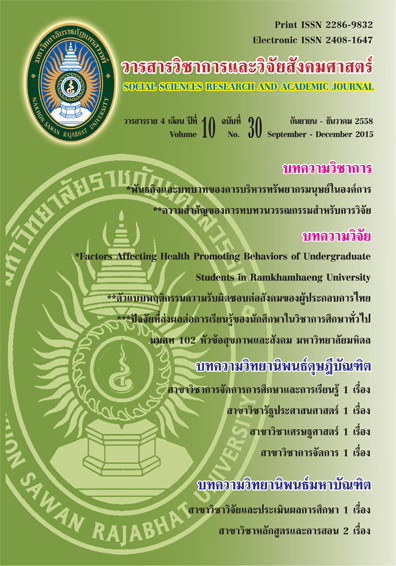ปัจจัยที่ส่งผลต่อการเรียนรู้ของนักศึกษาในวิชาการศึกษาทั่วไป มมศท 102 หัวข้อสุขภาพและสังคม มหาวิทยาลัยมหิดล; Factors Affecting Classroom Learning in General Education MUGE 102 topic of Health and Society among Mahidol University Students
Main Article Content
Abstract
บทคัดย่อ
การวิจัยนี้มีวัตถุประสงค์เพื่อศึกษากระบวนการเรียนการสอน และปัจจัยที่ส่งผลต่อการเรียนรู้ของนักศึกษาในวิชาการศึกษาทั่วไป มมศท 102 หัวข้อสุขภาพและสังคม กลุ่มตัวอย่างคือ นักศึกษาปริญญาตรีชั้นปีที่ 1 ของมหาวิทยาลัยมหิดล ภาคการศึกษาที่ 2/2554 โดยศึกษาจากประชากรทั้งหมด จำนวน 3,620 คน เก็บรวบรวมข้อมูลโดยใช้แบบสอบถามกับนักศึกษาขณะที่มาเรียนทุกคน ได้รับแบบสอบถามกลับคืนมา 1,380 ชุด คิดเป็นร้อยละ 38 ของกลุ่มตัวอย่างทั้งหมด วิเคราะห์ข้อมูลโดยการหาค่าร้อยละ ค่าเฉลี่ย ค่าส่วนเบี่ยงเบนมาตรฐาน และการวิเคราะห์การถดถอยพหุคูณ
ผลการวิจัยพบว่า
1. ปัจจัยด้านกระบวนการเรียนการสอนที่มีค่าเฉลี่ยระดับสูงสุด ได้แก่ ปริมาณของทฤษฎีที่นำมาสอน การอำนวยความสะดวกในห้องเรียนของผู้ช่วยสอน ความน่าสนใจของคลิปวีดีโอที่ใช้เป็นสื่อการสอน การมีโอกาสได้เรียนรู้ร่วมกับเพื่อนจากการทำงานกลุ่มของนักศึกษา เอกสารการสอนที่มีเนื้อหาเป็นเรื่องใกล้ตัวสอดคล้องกับชีวิตเป็นสิ่งสำคัญ และด้านการเรียนรู้ของนักศึกษาทั้งโดยรวมและรายข้อมีค่าเฉลี่ยระดับมาก
2. การพยากรณ์ตัวแปรสองชุด คือ ปัจจัยส่วนบุคคลของกลุ่มตัวอย่าง ได้แก่ เกรดเฉลี่ยสะสม บทบาทในงานกลุ่ม และปัจจัยด้านกระบวนการเรียนการสอน ได้แก่ การอำนวยความสะดวกของผู้ช่วยสอน วิธีการสอนของอาจารย์ ทั้ง 4 ปัจจัยสามารถนำมาร่วมกันอธิบายการเรียนรู้ของนักศึกษา อย่างมีนัยสำคัญทางสถิติที่ระดับน้อยกว่า .05 และอธิบายความแปรปรวนได้ 34.2% (R-Square = .342, F = 178.610, p-value = .000) โดยวิธีการสอนของอาจารย์เป็นตัวแปรที่มีอิทธิพลมากที่สุด (Beta = .484) รองลงมาคือ ผู้ช่วยสอน (Beta = .172) บทบาทในงานกลุ่ม (Beta = .071) และเกรดเฉลี่ยสะสม (ความรู้เดิม) (Beta = -.056) ตามลำดับ
Abstract
This study aimed to explore instruction process and explore the factors that affect classroom learning in General Education, MUGE 102, topic of Health and Social among Mahidol University students. The sample universe was all first-year students registered in Mahidol University General Education (MUGE 102) course in the 2nd semester of academic year 2011. The survey was conducted among all 3,620 registered students. A total of 1,380 students had completed the questionnaires, accounted for 38.0% response rate. Descriptive statistics included percentage distribution, mean, and standard deviation and multiple regression analysis.
The study had two main findings:
1. Components of instruction process related to learning outcomes that were rated highest included amount of theories used in the class, teaching assistants’ in-class facilitation, interestedness of teaching media, opportunities to participate in group activities, and reading materials that were compatible with everyday life while all components of learning outcomes were rated high by the study participants.
2. Students’ characteristics including student’s accumulative GPA and degree of contribution in group activities and two components of instruction process including teaching assistant’s in-class facilitation and instructor’s teaching method were significantly associated with students’ learning outcomes at p < 0.05. The four factors accounted for 34.2% of the variation of learning outcomes. Instructor’s teaching method was relatively the best predictor (Beta = .484), followed by TA’s in-class facilitation (Beta = .172), student’s contribution in group activities (Beta = .071), and accumulative GPA (Beta = -.056), respectively.


